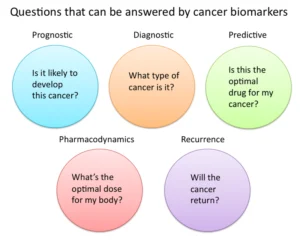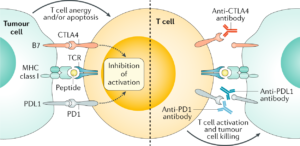Immunotherapy and Colon Cancer
Immunotherapy And Colon Cancer is a malignancy that begins in the large intestine located near the rear end of the digestive system. It is caused when tumorous growths (polyps) develop in the large intestine; these growths can be benign or precancerous. I would suggest (Dr. Sajjan Rajpurohit) regular screening for colon cancer at 50 years of age. Since it’s the third most deadly cancer worldwide. Immunotherapy for Colon Cancer is beneficial and a lot of points prove that.
Early Signs and symptoms include:
- A persistent change in bowel habits (diarrhea or constipation or a change in the consistency of your stool)
- Rectal bleeding or blood in the stool.
- Persistent abdominal discomfort (cramps, gas, or pain)
- Bloating and fullness: feeling that the bowel doesn’t empty completely
Diagnostic, predictive, and prognostic evaluation:

- Colonoscopy
- Biopsy (histopathology and immunohistochemistry)
- Molecular testing of the tumor
- Blood tests
- Computed tomography (CT or CAT) scan
- Magnetic resonance imaging (MRI)
Note: In the procedure of routine colonoscopy, if the presence of one or more polyps is observed, they are removed at the same procedure. Let’s all understand about different phases of development of colon cancer which is widely referred to as stages to as stages of cancer:
In colon cancer, the stages develop as follows:
Stages
- 0: Carcinoma in situ or cancer is in a very early stage (usually easy to treat)
- 1: Evident cancer has grown into the next layer of tissue within the colon
- 2: Cells of cancer have approached the outer layers of the colon (still not beyond the colon)
- 3: Notorious cells of cancer now have reached one to three lymph nodes Still, not spread to distant sites.
- 4: Notorious cancels like demons have progressed to distant parts of the body
Treatment options available will depend on the stage of colon cancer. Your medical oncologist will take the age, overall health status, and other characteristics of the individual into consideration for the best treatment option.
The aim of treatment in the world of oncology is to remove cancer, prevent its spread, and reduce symptoms in the patient affecting daily life.
The recent advances in the treatment of colon cancer besides chemotherapy, surgery, and radiation therapy include Immunotherapy.
Immunotherapy as the next frontier is helping medical oncologists fight colon cancer even at stage 4 (which is not operable)
Example:
Keytruda: an emerging class of drugs
Mechanism of action: block checkpoints PD-1 (enabling recognition and eradication of cancer cells by the human immune system itself)
Yes, inhibiting PD-1 in colon cancer would result in an appreciable prognosis where even a combination of targeted drug therapy is giving failed or average results.
Still, a challenge with immunotherapy in colon cancer is the availability of accumulated numerous mutations which generally are present due to “mismatch repair” (MMR) deficiency
MMR deficiency: in this condition, tumors are incapable of repairing damage to their DNA resulting in the accumulation of thousands of mutations.
So, screening of patients before providing immunotherapy needs expertise as provided by Dr. Sajjan Rajpurohit
Benefits of immunotherapy in colon cancer:

- Less toxic in comparison to chemotherapy
- Good prognosis: with evident shrinkage of tumor in the good timespan
- Predictive treatment: allows prediction of recurrence rate in combination with molecular sequencing strategical analysis
- Increased disease-free survival rate even at stage 4
As a doctor it’s really thriving to see your patient getting well, coming back to life, and especially when you see shrinkage of the tumor.
Boosting immunotherapy with a combination of targeted drug therapy, chemotherapy, or radiation therapy results in the activation of the immune response against cancer cells.
Ideas are “even cancer cells are not killed completely, at least some enough number of the cancer cells will be killed raising an immune response against them in the body”
Immunotherapy in high-risk stage 2 and stage 3 colon cancer:
The prognostic effect of the high microsatellite instability (MSI-h) is not unnoticed in many cases of high-risk stage 2 colon cancer or stage 3 colon cancer itself.
Also, colon cancer with a mismatch repair-deficiency (MMR-D)/microsatellite instability-high (MSI-H) phenotype carries unique characteristics such as increased tumor mutational burden and tumor-infiltrating lymphocytes; as per reported data in the literature.
So not only in terminal cancer but the role of immunotherapy in high-risk stage 2 cancer pre-operatively is dignified and has proven to give good results as adjuvant therapy also. For details, you can contact Dr. Sajjan Rajpurohit
Have anyone though different colors of shit or frequent diarrhea or constipation can be this much big:–well time to consult your doctor if age 50 plus.




